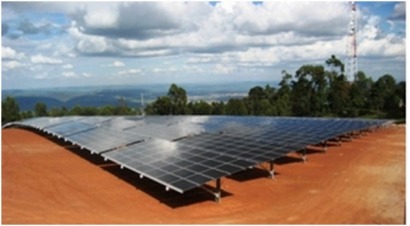
juwi Solar GmbH - a subsidiary of the international project developer juwi headquartered in Germany – has completed another rural electrification project in Northern Namibia.
The hybrid solar system supplies all public buildings and around 100 private households in Tsumkwe with clean solar power. With a total capacity of 200 kW, a battery storage of one megawatt and three integrated diesel generators it is one of Africa’ s largest off-grid solar power systems.
“We have set a standard with this plant that we would like to transfer to other African projects,” says Fabian Jochem, head of juwi’s Off-Grid Power Supply department.
August 15 will be a day to remember for Tsumkwe. For the first time in three years, the small community had an around-the-clock electricity supply. With rising oil and transportation costs, the community’s diesel generator could only be used for up to three hours per day.
The hybrid solar system has been constructed in only six weeks by juwi in cooperation with its regional partner Alternative Energy Systems cc. (Alensy). It supplies Tsumkwe’ s hospital ward, water supply, street lightning, police station, a radio station and the mobile network as well as 100 households with power.
The installed 918 polycrystalline modules supply Tsumkwe with 100 percent clean power during the day. Three diesel generators with a capacity of 630 KVA are integrated into the system and can be switched on in the evening or in case of a low battery. Via a transformer station the produced power goes to two 11 kV mini-grids. That way it is possible to disconnect so called “non-essential loads” – for example the street lightning – in favour of so called “essential loads” – for example the hospital ward. With the new system Tsumkwe can reduce its electricity costs by 25 percent.
The Tsumkwe Energy Project has been planned and supervised by the Desert Research Foundation Namibia’ s (DRFN). It will be operated by NamPower, the local power company. To ensure proper operation of the solar power plant, local technicians have been trained by juwi employees and have been made familiar with the operation and maintenance of the system. The plant is monitored and steered via a specific, juwi designed control system that controls both the SMA battery inverters and the regulation of the generator. Using GSM remote monitoring the solar plant can be controlled on the internet from Nambia’s capital city, Windhoek, or Germany.
For additional information:

